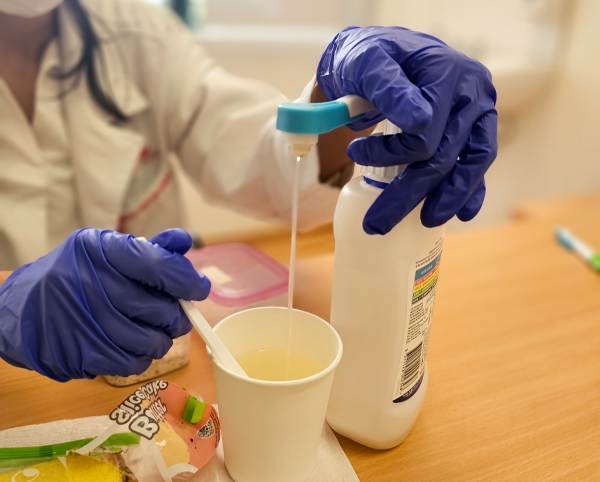The Heart of Speech Therapy: Interview with Speech-Language Therapist, Christina Rishika Lazarus
13 September 2024
Speech-language therapy is more than just helping people articulate words clearly; it's a vital service that supports individuals with communication, swallowing, and voice challenges, enabling them to connect and interact more effectively in their daily lives.
For Christina Rishika Lazarus, the path to becoming a speech and language therapist was shaped by both personal and professional experiences. Her expertise covers a wide range of issues, including those related to brain injuries, head and neck cancer, and stroke.

A Journey of Learning
Rishika’s journey into speech therapy began long before her formal education. Her mother, a special educational needs teacher, played a pivotal role in shaping her future. Inspired by her mother, a special educational needs teacher, Rishika was exposed early on to the idea of creating inclusive environments.
"My mother founded a school that brought both groups together, but there was a lot of resistance from parents of typically developing kids. They were worried their children might imitate behaviours from kids with special needs," Rishika recalls. "To show her commitment, she enrolled me and my sister in the school. I made a lifelong friend there, who had Down syndrome. She communicated through sounds and gestures, and that’s when I first became curious about how I could help people like her."
Building Trust and Collaborative Care
In her role today, Rishika predominantly works with adults, which presents its own unique set of challenges. “With children, they often adapt to their circumstances because that’s all they know. But with adults, you’re dealing with someone whose life has potentially changed overnight. They were fine one day, and now they’re here—needing our help.”
Establishing rapport with patients, especially adults who have been through life-altering events, can be difficult. "You have to be patient," she says. "Sometimes it’s not just about therapy. It’s about understanding what they enjoyed before the injury or illness, engaging their family in the process, and finding creative ways to build trust."
Rishika often works closely with other healthcare professionals, including neurologists, ENT surgeons, oncologists, respiratory doctors, and dietitians. This collaborative approach ensures her patients receive comprehensive care. For example, if a patient with swallowing difficulties also suffers from lung infections, Rishika works with doctors and nurses to find solutions that minimise risks and improve the patient’s quality of life.


Bringing a Voice to the Voiceless
For Rishika, the most rewarding part of her job is giving her patients the ability to express themselves—whether through speech, gestures, or writing. “Sometimes it’s not about the words; it’s about helping someone feel heard, to help them communicate what they want or need in any way possible.”
Helping patients rediscover the joy of eating and drinking is another significant aspect of her role. Many of her patients, particularly those recovering from severe illnesses, have been unable to enjoy food for months. "Seeing the look on their faces when they can finally eat something they've been craving, like a piece of cake or a simple bowl of porridge, is truly rewarding."
Managing Expectations and Misconceptions
Like many healthcare professionals, Rishika faces challenges balancing expectations—both from patients and their families. "It can be tough to manage those expectations, especially when patients hope to return to how they were before. But my job here is to get them as close to 100% pre-morbid as possible and ensure that they’re able to go back home and find joy in their lives again.”
One common misconception Rishika addresses is the confusion between speech therapists and English teachers. "No, we don’t write your speeches. We are not English teachers. We are clinicians," she explains. "We help individuals with language communication issues and voice problems. Our work involves aiding recovery and improving vocal health, especially for professionals who rely heavily on their voice."
Rishika stresses the importance of vocal care. "One crucial tip for protecting your voice is to avoid throat clearing," she advises. "Throat clearing can be harsh on the delicate muscles used to produce voice, leading to potential vocal issues." She also recommends staying hydrated and avoiding smoky or dry environments to maintain vocal health.
Finding Joy in the Little Things
Rishika recently started a book club, which she looks forward to every month. "We meet to discuss a selected book, and our gatherings include fun activities like poetry painting, picnics, and book swaps," she shares. "It’s a wonderful way to connect with others and enjoy literary discussions,” she shares
Matcha is a beloved part of Rishika’s daily routine. "I make a matcha latte each morning as a ritual to start my day," she explains. "The process of preparing matcha, from whisking to enjoying the drink, helps me feel centred and sets a positive tone for the day." When she's not working or enjoying matcha, she relaxes by binge-watching Netflix series. "It's a perfect way to unwind after a busy week," she notes.

Her Message to Future Therapist
"We need more speech therapists! It’s a fulfilling career where you can truly make a difference in your patients' lives. If you’re passionate about helping others and enjoy the blend of clinical and personal interaction, this field is for you."
Thank you, Rishika, for your unwavering support in helping patients express themselves when they cannot.






